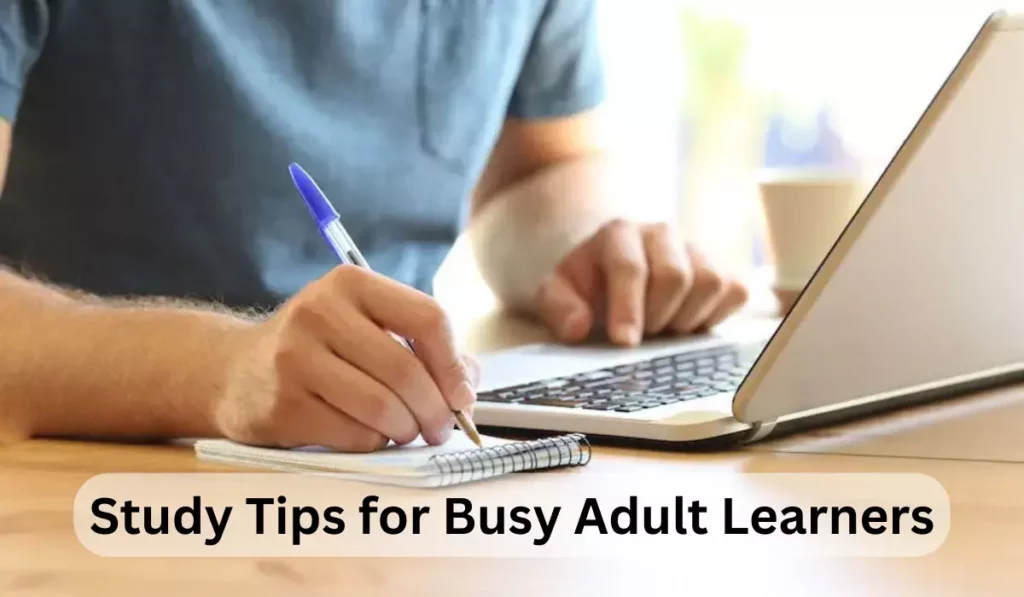In today’s fast-paced world, adult learners face unique challenges as they juggle work, family, and education. The pursuit of academic goals amidst these responsibilities requires not only dedication but also effective strategies to manage time and resources. This blog post aims to provide practical study tips tailored for busy adult learners. These tips are designed to enhance learning efficiency, reduce stress, and help in achieving academic success without compromising other life aspects. Whether you’re returning to education after a long break or balancing studies with a full-time job, these strategies will empower you to excel in your academic journey.
The Challenges Faced by Adult Learners
Adult learners often grapple with a unique set of challenges that can impact their educational journey. Unlike traditional students, they typically have to balance full-time jobs, family responsibilities, and personal commitments along with their studies. This balancing act can lead to time constraints, increased stress, and a feeling of being overwhelmed. Additionally, returning to an academic setting after a long hiatus can be daunting, as they may need to refresh forgotten study skills or adapt to new learning technologies. Understanding these challenges is the first step in developing effective strategies to overcome them.
Importance of Effective Study Strategies
For busy adult learners, effective study strategies are not just helpful – they are essential. These strategies enable learners to maximize their limited study time, retain more information, and reduce the stress associated with juggling multiple responsibilities. By adopting the right approaches to learning, adult students can improve their academic performance, stay motivated, and achieve their educational goals more efficiently. This blog will explore various techniques and tips that can be integrated into the daily routines of adult learners to enhance their study experience.
Setting Clear Academic Goals
Setting clear academic goals is crucial for adult learners. It provides direction, motivation, and a benchmark for measuring progress. Start by defining what you want to achieve in your studies, whether it’s obtaining a degree, mastering a specific skill, or advancing in your career. Make your goals specific, measurable, achievable, relevant, and time-bound (SMART). For instance, instead of a vague goal like “get better at accounting,” aim for “complete an online accounting course with a score of 90% or above by the end of the quarter.” Clear goals keep you focused and motivated, especially when balancing studies with other responsibilities.
Time Management and Prioritization
Effective time management and prioritization are vital for adult learners. Begin by assessing your weekly schedule and identifying blocks of time that can be dedicated to studying. Prioritize tasks based on urgency and importance, focusing first on assignments with approaching deadlines or high impact on your grades. Utilize tools like digital calendars, to-do lists, or time management apps to keep track of your commitments and deadlines. Remember, it’s not about finding more time; it’s about making the most of the time you have. Allocating specific time slots for studying can help ensure consistent progress without neglecting other life responsibilities.
Creating a Dedicated Study Space
Having a dedicated study space is essential for maintaining focus and organization. Choose a quiet, comfortable area in your home where you can study without interruptions. Ensure that this space is well-lit, ergonomically set up, and free from distractions like television or household noise. Having a specific place for studying can also psychologically prepare you to switch into ‘study mode.’ Organize your study materials and tools in this space, so everything you need is within reach. A well-arranged study area can significantly enhance your concentration and efficiency.
Utilizing Learning Resources
Adult learners have a wealth of learning resources at their disposal. Beyond textbooks and lectures, explore online courses, educational podcasts, video tutorials, and e-books. Many universities and educational platforms offer free or low-cost resources tailored to adult learners. Don’t hesitate to reach out to instructors or join study groups for additional support. Libraries, both physical and digital, are invaluable resources for research and study materials. By diversifying your learning resources, you can find methods that best suit your learning style and schedule.
Strategies for Effective Note-Taking
Effective note-taking is a skill that enhances understanding and retention of information. Start by choosing a method that works best for you, such as the Cornell method, mind mapping, or bullet journaling. Focus on capturing key concepts and details during lectures or while reading, rather than transcribing everything verbatim. Use abbreviations and symbols to save time. Review and organize your notes shortly after the lecture or reading session to reinforce learning and clarify any misunderstandings. Good notes serve as a valuable study aid when preparing for exams or completing assignments.
Efficient Reading and Information Processing
Efficient reading and information processing are critical for adult learners who often have limited time for study. Skim through the material first to get a general idea of the content. Then, read more thoroughly, focusing on key concepts and arguments. Use techniques like highlighting, summarizing, and questioning to engage actively with the material. Break down complex information into smaller, manageable parts. Practice critical reading by evaluating the credibility of sources and the strength of arguments. This approach not only saves time but also enhances comprehension and retention.
Mindful and Active Learning Techniques
Mindful and active learning techniques can significantly improve focus and understanding. Mindful learning involves being fully present and engaged with the study material, free from distractions. Techniques like meditation or deep breathing before a study session can help achieve this state. Active learning, on the other hand, involves interacting with the material through discussions, teaching others, or applying concepts to real-life situations. These techniques encourage deeper understanding and long-term retention of information. Incorporating these methods into your study routine can make learning more effective and enjoyable.
Utilizing Technology for Learning
Technology offers a range of tools that can enhance the learning experience for adult learners. Educational apps can help with organization, time management, and habit building. Online platforms provide access to courses, lectures, and digital libraries. Tools like flashcard apps, mind mapping software, or digital note-taking apps can make studying more efficient and engaging. Embrace technology to create a personalized learning environment that fits your lifestyle and learning preferences. However, be mindful of the potential for digital distractions and strive to use technology in a way that supports, rather than hinders, your academic goals.
Balancing Work, Family, and Studies
Balancing work, family, and studies is a common challenge for adult learners. To manage this, communicate your academic commitments to your employer and family. Seek their support and understanding, especially during periods of high academic workload. Learn to delegate tasks at work and home when possible. Consider flexible study options, like online courses or part-time programs, that can fit around your other commitments. Remember, maintaining a balance is key to avoiding burnout and ensuring success in all areas of your life.
Overcoming Procrastination and Distractions
Procrastination and distractions can significantly hinder the progress of adult learners. To overcome these, start by identifying the reasons behind your procrastination and the common distractions you face. Set small, achievable goals to build momentum and use techniques like the Pomodoro Technique to maintain focus. Create a study environment that minimizes distractions, and consider using apps that block distracting websites or notifications during study time. Remember, consistency is key. Regular, focused study sessions are more effective than sporadic, distracted ones.
Building a Support System
Having a support system is crucial for adult learners. This can include family members, friends, classmates, or even online communities. Share your goals and challenges with them; they can offer encouragement, advice, and accountability. Participate in study groups or online forums related to your field of study. These groups can provide moral support, study tips, and networking opportunities. Remember, you’re not alone in your academic journey. Building a strong support system can provide the motivation and assistance you need to succeed.
Coping with Stress and Burnout
Coping with stress and burnout is essential for maintaining mental and physical health. Develop stress-reduction techniques like regular exercise, meditation, or hobbies. Ensure you’re getting enough sleep and eating a balanced diet. Learn to recognize the signs of burnout, such as chronic fatigue, decreased motivation, or feelings of frustration. When you feel overwhelmed, take a step back and give yourself a break. It’s important to balance your studies with self-care and relaxation to maintain your well-being and academic performance.
Customizing Study Plans
Customizing your study plan is key to effective learning. Recognize your learning style, whether it’s visual, auditory, or kinesthetic, and tailor your study methods accordingly. Allocate more time to subjects or topics you find challenging. Be flexible with your plan; if certain strategies aren’t working, don’t hesitate to adjust them. A personalized study plan that suits your individual needs, schedule, and learning style can significantly enhance your efficiency and motivation.
Evaluating Progress and Making Adjustments
Regularly evaluating your progress is important to ensure you’re on track with your academic goals. Set aside time periodically to review what you’ve learned and assess your understanding. Use self-assessment tools, quizzes, or discuss concepts with peers to gauge your progress. If you find certain areas lacking, adjust your study plan or seek additional resources or help. Remember, learning is a dynamic process, and it’s okay to make changes to your strategies as you go along.
Success Stories and Testimonials
Hearing success stories and testimonials from other adult learners can be incredibly motivating. These stories provide real-life examples of overcoming challenges and achieving academic success. They can offer practical tips, inspire perseverance, and remind you that your goals are attainable. Whether it’s through online forums, academic journals, or personal networks, seek out these stories to boost your motivation and gain insights from those who have navigated similar paths.
Conclusion and Encouragement for Adult Learners
In conclusion, while the journey of an adult learner is challenging, it is also immensely rewarding. The key is to find study strategies that work for you, maintain a balance between your various responsibilities, and stay motivated throughout your academic journey. Remember, every small step you take is a progression towards your goal. With determination, flexibility, and the right approach, you can successfully manage your studies alongside other commitments. Keep pushing forward, and believe in your ability to succeed as an adult learner.
Source:
A Professor’s Top 6 Study Tips for Adult Learners | BestColleges. (n.d.). BestColleges.com. https://www.bestcolleges.com/blog/study-tips-adult-learners/
Essential Study Skills for Adults Returning to School. (n.d.). https://degrees.snu.edu/blog/essential-study-skills-for-adults-returning-to-school






